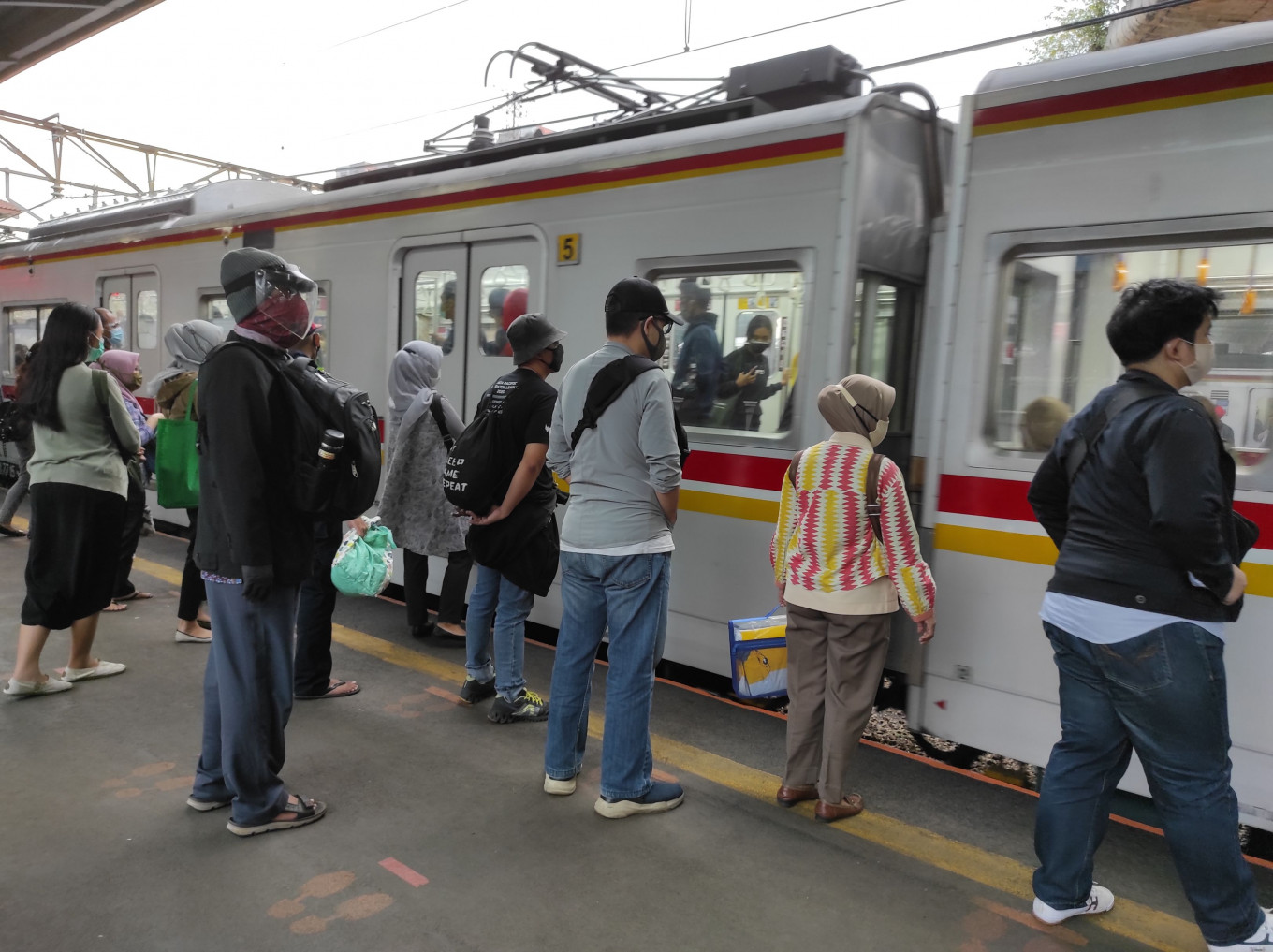Popular Reads
Top Results
Can't find what you're looking for?
View all search resultsPopular Reads
Top Results
Can't find what you're looking for?
View all search resultsDespite drop in cases, Jakarta urged to stay alert
Vigilance, health protocols must be maintained ahead of Idul Fitri
Change text size
Gift Premium Articles
to Anyone
J
akarta, Indonesia’s COVID-19 hotbed, has seen a steady decrease in the number of daily cases and deaths in the past nine weeks, the longest decline since the pandemic hit the capital in March last year.
Despite the good news, authorities and experts have warned the public to remain vigilant and disciplined in implementing health protocols, especially ahead of Idul Fitri holiday season in May when Jakarta expects to see increased mobility of people in and out the city.
Ronald Bessie, coordinator of volunteers for crowdsourced database KawalCOVID-19, said the number of fatalities among COVID-19 patients in Jakarta had dropped around 60 percent since early February.
On Feb. 1, Jakarta recorded 70 deaths, its highest daily rate yet. But the average number of daily deaths in the past week has decreased to around 11. Last Tuesday, Jakarta reported three deaths, the lowest since August.
The number of people buried under COVID-19 protocols across Jakarta, which includes COVID-19 suspects, also declined from an average of 78 people per day in the first week of February to around 36 people last week.
The city's other pandemic indicators, such as active cases, hospital bed occupancy rate and positivity rate, have also steadily improved.
The number of daily cases has dropped by around 70 percent, from an average of 3,370 daily cases in the first week of February to 968 cases last week. On Tuesday, Jakarta recorded 487 new confirmed cases, bringing the total number of recorded cases citywide to around 387,500, with 6,000 active cases and 6,300 deaths.
Jakarta Health Agency head Widyastuti said that in the past two weeks, the number of active cases had decreased by around 1,200, from 7,200 to 6,000.
Ronald said, however, the decrease in daily cases may partly be attributed to a 50 percent decrease in the city's testing rate.
The Jakarta administration managed to carry out 18,000-20,000 tests per day in late January, but by the end of March it conducted only 7,000-10,000 tests per day.
But despite the decline, Jakarta still surpasses the minimum testing requirements set by the World Health Organization (WHO) of 1,500 people per day. The city's positivity rate has also decreased from 24 percent in February to around 10 percent in the past week, indicating that tests have been conducted adequately.
As a result of the decline in cases, the city's bed occupancy rate has been significantly improving. Widyastuti said 54 percent of 7,800 beds in isolation rooms across the city were occupied on March 21 but the number dropped to 44 percent by April 5.
A similar trend is being seen for ICU rooms, whose occupancy rate dropped 11 percentage points in the past two weeks, from 59 to 48 percent.
With its pandemic indicators steadily improving, Jakarta managed to lower its transmission risk level from red (high) to orange (moderate) in March and the city has maintained it for the last four weeks.
Masdalina Pane, a consultant for the Centers for Disease Control and Prevention of the Indonesian Epidemiology Association (CDC-PAEI), said the falling number of cases and deaths was mainly the result of stronger contact tracing conducted by authorities.
Last November, the Health Ministry and the national COVID-19 task force ramped up contact tracing by recruiting up to 7,000 volunteers to track cases in 57 cities and regencies with high risk of virus transmission, including Jakarta. After the program was launched, most of these cities were able to track close contacts of more than 80 percent of all cases in their respective area.
"The number of confirmed cases in Jakarta has been decreasing for nine weeks in a row and in the past five weeks we've seen at least a 50 percent case drop since the latest peak in January,” Masdalina said on Monday. “This never happened before contact tracing was strengthened.”
According to the WHO, a decline of at least 50 percent over a three-week period since the latest peak and continuous decline in the observed incidence of confirmed and probable cases means that the outbreak has been successfully controlled.
Masdalina said the significant decrease in the death rate also indicated that cases were found in the early stages and shows that active case finding has been carried out effectively.
Despite the improvement, the Jakarta administration decided on Monday to extend its restrictions policy, the so-called micro-scale mobility restrictions (PPKM Mikro), for another two weeks.
"We want to maintain this positive trend and improvements. So we urge the public to remain vigilant, especially following the Easter long weekend last week. We need to prepare for a potential increase in cases," Widaystuti said on Monday as reported by tempo.co.
Ronald echoed similar concerns, citing a potential case spike in the upcoming Idul Fitri holiday in May.
“Nobody can guarantee that there won't be a second wave in the future, so I urge the public to remain alert and disciplined in following health protocols," he said.
The government has banned the coming Idul Fitri tradition of mudik (exodus) for the second consecutive year to prevent a spike in virus transmission. However, experts believe mobility will increase considering that violations of mobility restrictions were rampant last year, and that many tourist spots are reopening across the archipelago.










